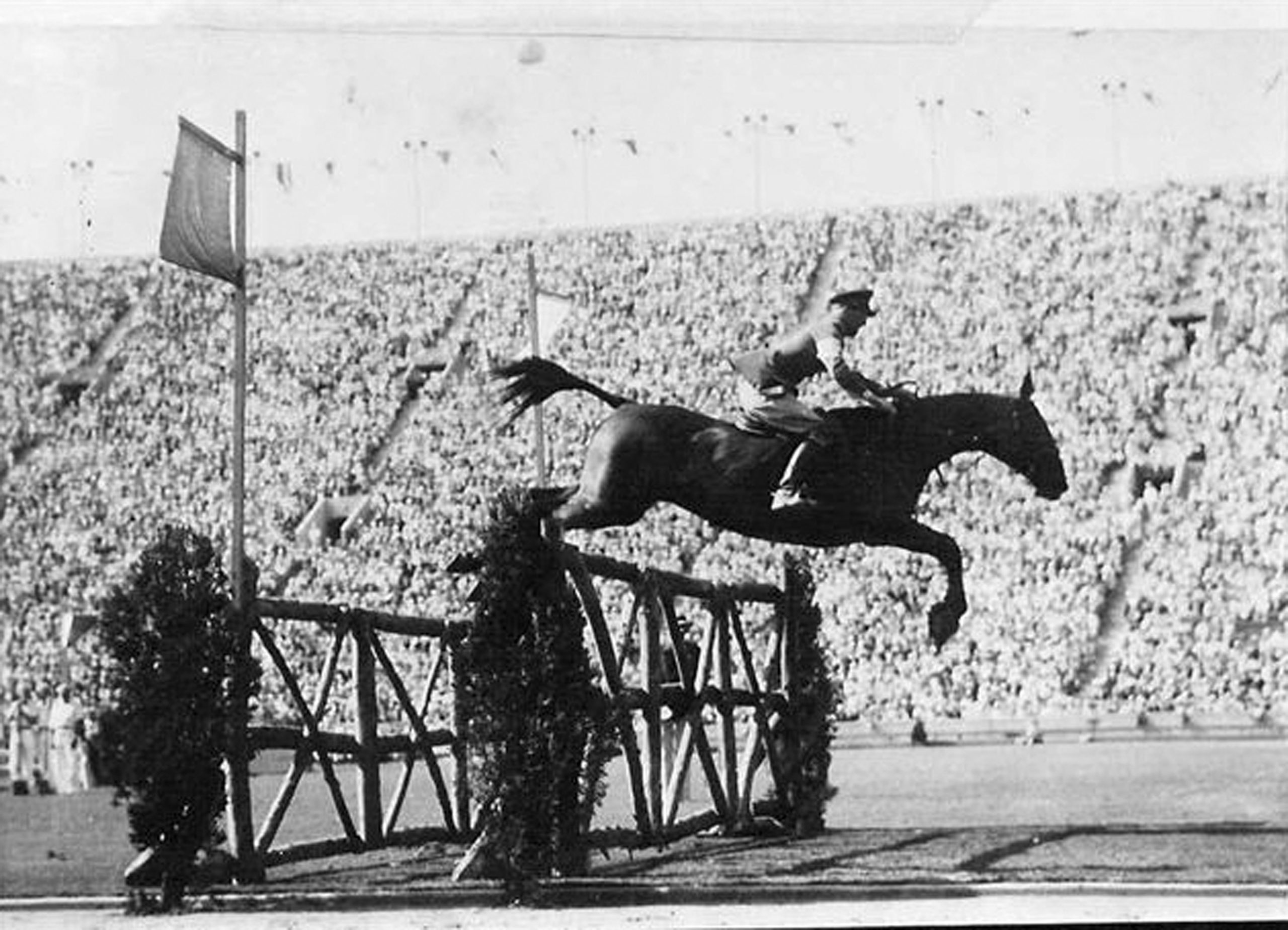In this excerpt from his autobiography Still Horse Crazy After All These Years, Olympian Jim Wofford reminisces about his early Olympic experiences and his family’s long and unusual connection to the quadrennial event.
The first Olympics I remember were in London in 1948. At that time the U.S. Army was still in
charge of all three Olympic equestrian disciplines, so the riders were all officers, the horses
were for the most part owned by the Army, and the grooms and farriers were all enlisted men.
Master Sergeant Harry Cruzan was Major F.F. “Fuddy” Wing’s groom then. Harry was only a
lowly corporal at that time, but he will resurface in my tale. I remember him telling me 20 years
later that they had a heavy wooden trunk for each horse, an additional one for the vet, one for
the farrier—and one full of whiskey!
Speaking of whiskey—years later, I commented to my mother that equestrian team
selection was getting more and more competitive. “You have no idea,” she told me. During
Prohibition, the Army horse show team went up to the Royal Winter Fair in Toronto. The horses
shipped on special trains, and the team always took a certain horse who wasn’t much account
when it came to jumping, but he was hell to kick, so no customs official in his right mind would
get in the stall with him. The team stored their hay behind Widowmaker on the way up to
Toronto, and for the trip back down they built a wall of hay that concealed a year’s supply of
Prohibition-era whiskey for all concerned. “You just think teams are competitive these days,”
my mother said. “Those young officers would have killed each other for a chance at smuggling
home a year’s supply of whiskey!”
I was only three years old during the 1948 London Olympics, so I remember very little of
that time. I do recall that the damage done by the Blitz was still evident everywhere. Rationing
was still in effect, so my mother had brought an extra steamer trunk full of Hershey’s chocolate
bars, silk stockings, and other delicacies and necessities. She also brought a case of rice, which
had been unavailable in England since 1939. These treasures made us popular with our friends
in England. (Fortunately, I found a way to jigger the lock on the trunk and break into the
chocolate stash; I stayed sugar-buzzed for the entire trip.)
 Photo courtesy of the US Army.
Photo courtesy of the US Army.
While General Humberto Mariles of Mexico was winning the gold medal in show
jumping on Arete, I snuck into the enclosure at the base of the Olympic flame tower in
Wembley Stadium to do what little boys do. A horrified English bobby, helmet and all, chased
me over the fence, calling me a “horrid little boy.” He did not know how right he was.
In the early summer of 1952 we boarded a special train in Junction City, Kansas, and I
remember riding the train to a siding at Fort Riley, where the horses and equipment were
loaded. The three teams left for a European tour leading up to the Helsinki Olympics. (One thing
about training teams that has not changed is the continuing need for European exposure before
big competitions.) The horses crossed the Atlantic on a British cargo ship, the SS Parthia, and
once they got to Europe they traveled by rail, as horse vans were not yet in general usage.
Although Helsinki was a lovely venue for the equestrian part of the 1952 Games, given
my age at the time I was more interested in watching the sinister-appearing KGB agents hustle
the USSR riders out of a van and into locked stables than I was in the fact that the USET won
bronze medals in both eventing and show jumping. This was the first instance I can recall of the trend toward the politicization of the Games, but the Games have never been as pure as Baron
de Coubertin would have wanted us to believe. I wasn’t around yet in 1936, when Hitler
refused to award Jesse Owens his gold medal at the Berlin Olympics, but my parents were in
the stands.
Politicization of the Olympic movement has continued in various forms with the
Communist riots and Black Power protest in 1968 at Mexico City, the Black September
terrorists’ murder of the Israeli athletes at Munich in 1972, and the United States and USSR
boycotts of 1980 and 1984. You can be sure that human-rights advocates and environmentalists
will be making things lively in future Olympics.
As a personal aside, my oldest brother, Jeb Wofford, was on the bronze medal eventing
team at Helsinki. The average age of the riders on the U.S. Eventing Team team that year was
twenty, and the average age of the horses was seven—quite a contrast with the rider and horse
demographics of today.
In addition, my mother owned Hollandia, a lovely chestnut mare on the show-jumping
team. Hollandia was by Bonne Nuit, one of the most successful Thoroughbred jumping sires of
the 1950s. He jumped in two Olympics: for the United States in 1952 with Bill Steinkraus and for
Great Britain in 1960 with my sister-in-law Dawn Palethorpe Wofford aboard. When Dawn’s
engagement to my brother Warren was announced in 1957, she got a telegram from Jack
Talbot-Ponsonby, the British show jumping chef d’équipe: “Marry Wofford and get Hollandia.”
She did both, which meant that her name was now on the ownership papers, and she had
retained her citizenship in the United Kingdom. In those years, international rules required that
both the rider and the owner had to be from the same country in order to compete in the
Olympics, World Championships, or Pan American Games. In a few years those rules would play
a big part in my story.
This excerpt from Still Horse Crazy After All These Years by Jim Wofford is reprinted with
permission from Trafalgar Square Books (www.horseandriderbooks.com).

